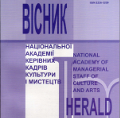АЛЕКСАНДЕР БРЮКНЕР ТА СТУДІЮВАННЯ ПРОБЛЕМАТИКИ ГЕРМАНО-СЛОВ’ЯНСЬКИХ КУЛЬТУРНИХ КОНТАКТІВ
ALEKSANDER BRÜCKNER AND THE STUDY OF ISSUES OF GERMAN-SLAVIC CULTURAL CONTACTS
Author(s): Yevhen HorbSubject(s): Language studies, Theoretical Linguistics, Comparative Linguistics, Higher Education , Sociology of Culture
Published by: Національна академія керівних кадрів культури і мистецтв
Keywords: Aleksander Brückner; cultural dialogue; frontier culture; cultural linguistics; Slavic studies; University of Berlin;
Summary/Abstract: The purpose of the work is to cover the views of Polish-German cultural historian and Slavist A. Brückner on the issue of German-Slavic cultural dialogue, which is key in the scientist's scientific and journalistic work. The research methodology is based on a comprehensive and interdisciplinary approach to solving the issue, a combination of both general scientific principles and research methods, as well as special ones, however, the basis of the theoretical and methodological tools when studying the issue of scientific development of the topic of intercultural dialogue by A. Brückner were the methods of modern cultural studies (biographical, method of factor analysis, content analysis, classification). The scientific novelty of the publication consists in the formulation of a complex, multi-level issue, which has hardly been researched in Ukrainian and foreign cultural studies. For the first time in national cultural studies, a complex and comprehensive study of A. Brückner's views on the issue of cultural interactions between Germanic and Slavic worlds is proposed, the influence of Aleksander Brückner's life circumstances on the formation and evolution of his cultural concepts is determined. Conclusions. The article points up the thesis about the ambiguity and controversy of A. Brückner's scientific views on the issue of cultural contacts between Slavs and Germans, who, according to the scientist, intersected and interacted on the territory of Poland. It is stressed that the specific nature of Aleksander Brückner's cultural generalisations is attributed to his linguistic approach to solving the debatable issues of intercultural relations since the Berlin professor considered language to be one of the main categories of culture and even equated the concepts of “culture” and “language” in his works. The attitude of A. Brückner's contemporaries to his scientific work is determined, which was revealed in numerous critical reviews by such outstanding representatives of Polish linguistics as J. Baudouin de Courtenay and H. Ułaszyn.
Journal: Вісник Національної академії керівних кадрів культури і мистецтв
- Issue Year: 2023
- Issue No: 4
- Page Range: 26-31
- Page Count: 6
- Language: Ukrainian

